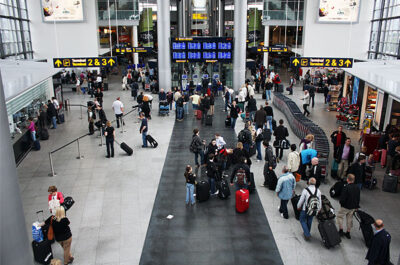Where passengers reach their final destination three hours or more after the scheduled arrival time, they may claim fixed compensation from the airline, unless the delay is caused by extraordinary circumstances.
EU law provides that, if their flights are cancelled, passengers may receive fixed compensation amounting to between €250 and €600. In the judgment in Sturgeon and Others, the Court of Justice found that passengers whose flights are delayed may be treated the same way as those whose flights are cancelled as regards their right to compensation. Thus, the Court held that if passengers reach their final destination three hours or more after the arrival time originally scheduled, they may claim fixed compensation from the airline, unless the delay is caused by extraordinary circumstances.
The Amtsgericht Koln (Local Court, Cologne) and the High Court of Justice (England and Wales) seek clarification concerning the scope of the judgment in Sturgeon and Others. In the first case (C 581/10), the German Court is hearing a dispute between passengers and the airline Lufthansa concerning the delay to the passengers’ flight of more than 24 hours in relation to the original schedule. In the second case (C-629/10), TUI Travel, British Airways, easyJet Airline and the International Air Transport Association (IATA) have brought proceedings before the United Kingdom Courts following the Civil Aviation Authority’s refusal of their request not to impose on them an obligation to compensate passengers whose flights are delayed. That independent regulator, responsible for enforcing aviation regulation in the United Kingdom, had stated that it was bound to give effect to the ruling in Sturgeon and Others.
By its judgment yesterday, the Court confirms its interpretation of EU law in the judgment in Sturgeon and Others. It reiterates that the principle of equal treatment requires that passengers whose flights are delayed and those whose flights are cancelled ‘at the very last moment’ must be regarded as being in comparable situations as regards the application of their right to compensation, because those passengers suffer similar inconvenience, namely, a loss of time.
Since passengers whose flights are cancelled are entitled to compensation where their loss of time is equal to or in excess of three hours, the Court finds that passengers whose flights are delayed may also rely on that right where, on account of a delay to their flight, they suffer the same loss of time, that is, where they reach their final destination three hours or more after the arrival time originally scheduled by the air carrier.
Nevertheless, in adopting Regulation No 261/2004, the EU legislature was seeking to strike a balance between the interests of air passengers and those of air carriers. Accordingly, such a delay does not entitle passengers to compensation if the air carrier can prove that the long delay is caused by extraordinary circumstances which could not have been avoided even if all reasonable measures had been taken, namely circumstances beyond the actual control of the air carrier.
The Court also finds that the requirement to compensate passengers whose flights are delayed is compatible with the Montreal Convention. In that connection, the Court finds that the loss of time inherent in a flight delay constitutes an inconvenience which is not governed by the Montreal Convention. Consequently, the obligation to compensate passengers whose flights are delayed falls outside the scope of that convention, but remains additional to the system for damages laid down by it.
Next, the Court holds that that obligation is also compatible with the principle of legal certainty according to which passengers and air carriers must know precisely the respective scope of their rights and obligations.
In addition, the Court makes clear that the requirement to compensate passengers whose flights are delayed is consistent with the principle of proportionality, according to which measures adopted by EU institutions must not exceed the limits of what is appropriate and necessary in order to attain the legitimate objectives pursued by the legislation in question, and the disadvantages caused must not be disproportionate to the aims pursued. In that connection, the Court notes that the obligation to pay compensation does not concern every delay, but only long delays. Moreover, airlines are not obliged to pay compensation if they can prove that the cancellation or long delay is caused by extraordinary circumstances.
Lastly, the Court considered the requests from the airlines concerned to limit the temporal effect of its ruling. Those airlines submit that EU law cannot be relied upon as the basis for claims by passengers for compensation in respect of flights which have been the subject of delay prior to the date of delivery of the present judgment, except as regards passengers who had already brought court proceedings for such compensation as of the date of the judgment.
In that regard, the Court answers that there is no need to limit the temporal effects of the present judgment.
Vicky is the co-founder of TravelDailyNews Media Network where she is the Editor-in Chief. She is also responsible for the daily operation and the financial policy. She holds a Bachelor's degree in Tourism Business Administration from the Technical University of Athens and a Master in Business Administration (MBA) from the University of Wales.
She has many years of both academic and industrial experience within the travel industry. She has written/edited numerous articles in various tourism magazines.









































































































































































